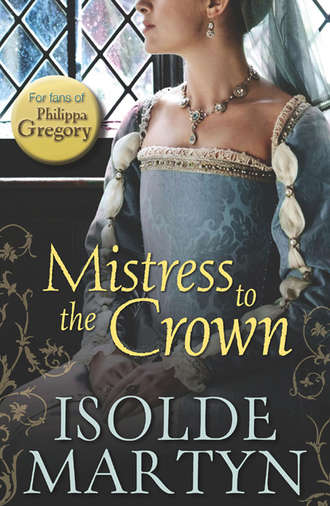
Полная версия
Mistress to the Crown

REVIEW QUOTES FOR MISTRESS TO THE CROWN
‘Isolde Martyn’s Mistress to the Crown beautifully spins the real history of a fascinating woman into a compelling novel of passion, suspense, and, amazingly, a happy ending for one of England’s most famous royal mistresses. Marvellous!
— Mary Jo Putney, author of No Longer a Gentleman
‘Rich and vivid as a gorgeous medieval tapestry, Isolde Martyn’s Mistress to the Crown enchants from first page to last. Passion, drama, glamour and wit turn this story of a woman who challenges her world into an unforgettable experience.’
— Anna Campbell, international best-selling historical romance author
‘What joy to find a novel that blends sound research with a love story that, on its own, would attract a wealth of romance readers. Isolde Martyn links her skill as an award-winning novelist with her depth of historical knowledge to reveal the life and loves of Elizabeth Lambard (Mistress Shore), and presents her as one of the strongest, most accomplished, lovely and lovable women of the fifteenth century. It’s fact and fiction at its best, a must-have for your bookshelves.’
—Julia Redlich, former fiction editor of Woman’s Day; secretary of the New South Wales branch of the Richard III Society
‘A richly textured historical tale of a fascinating woman with a surprisingly modern determination to live life on her own terms.’
— Anne Gracie, international best-selling Regency Romance author
Mistress to the Crown
Isolde Martyn

www.millsandboon.co.uk
About the Author
ISOLDE MARTYN is originally from England and has an Honours degree in History, with a specialisation in the Wars of the Roses.
She ended up in Australia after meeting a rather nice geologist at a bus stop. Since then she has worked as a university tutor, an archivist and for six years as a researcher in historical geography at Macquarie University. She spent a year researching sedition in early colonial Australia and then became heavily involved in the Bicentenary History project and researched all the towns in Australia for the Bicentenary volume Events and Places.
Her more recent career was as a senior book editor with a major international publisher before taking up writing full time.
Isolde enjoys using turbulent historical events as the backdrop of her books. Her debut novel was the first book by an Australian writer to win the prestigious RITA award in the USA and her first two novels have won the ‘Romantic Book of the Year Award’ in Australia.
She is a former chair of the Richard III Society and Vice-Chair of the Plantagenet Society of Australia, which she co-founded with five other enthusiasts twelve years ago.
MISTRESS TO THE CROWN is her fifth novel.
For my cousins, Rita and Yvonne, and for Simone,
who was once my youngest reader and who
overcame illness with such courage
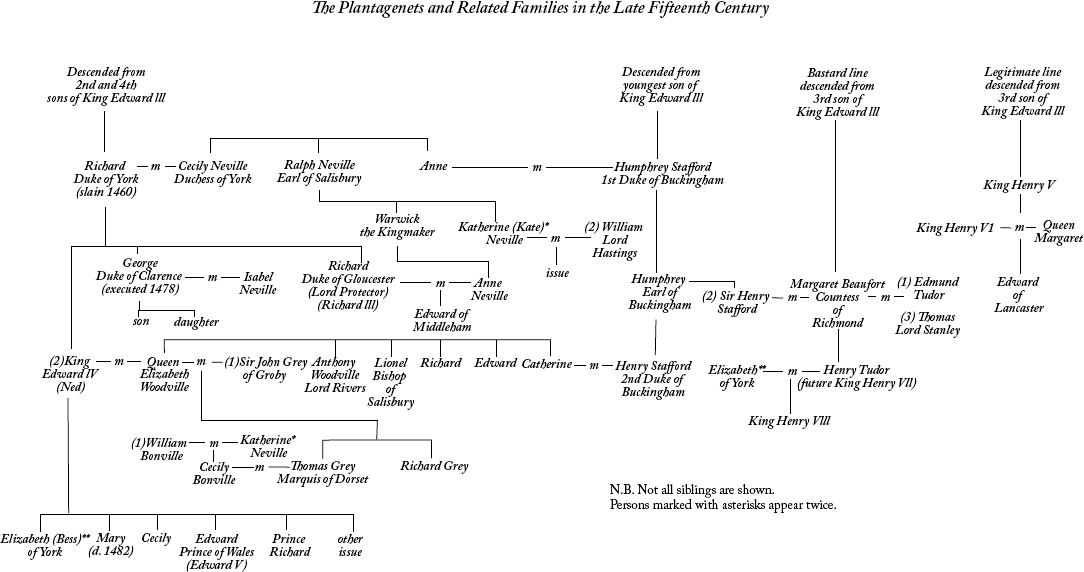
Characters appearing in this novel
Nearly all these persons are historical. Where the given name of a person is unknown and it has been necessary to create one, these are marked with one asterisk. Fictional characters are marked with two asterisks.
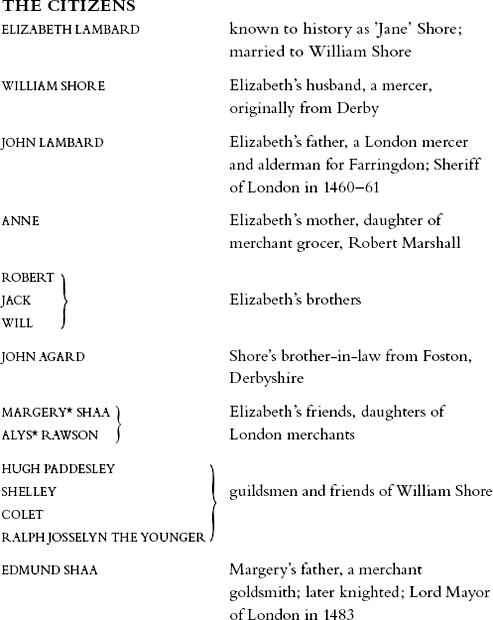
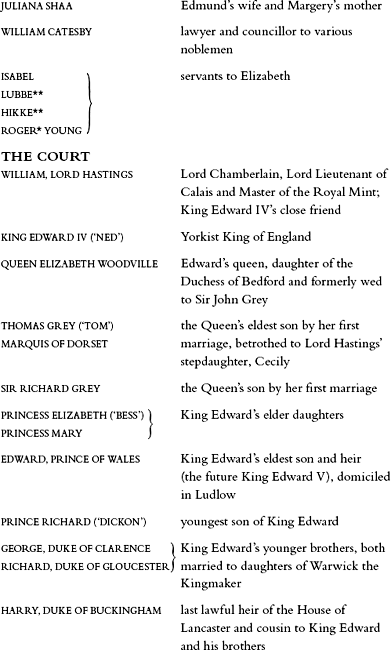
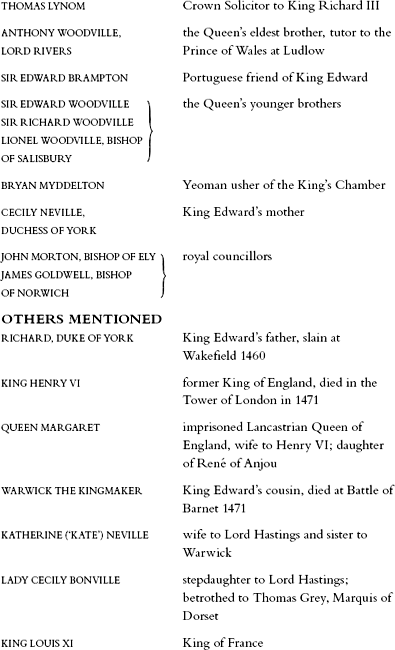
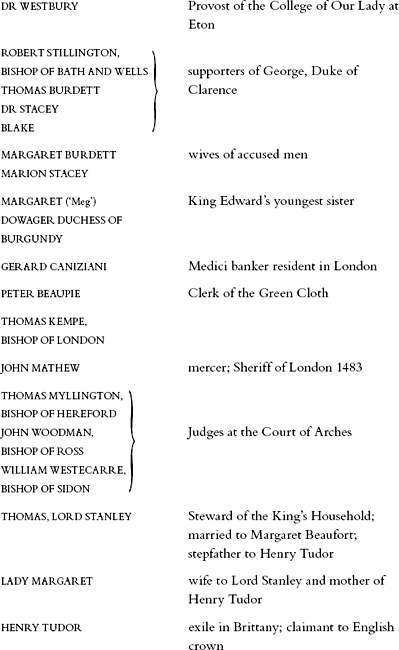
Soper’s Lane, the City of London, 1463
At fourteen, we make mistakes. I had been a fool to come to this old man’s chamber on my own, but I was desperate for legal advice on how to annul my marriage. He had told me he was a former proctor, a church lawyer – exactly what I needed – and he had seemed as friendly as a kindly grandfather when I spoke to him after Mass on Sunday. But now he was tonguing his cheek as he eyed my body, and dancing his fingers slowly on the table between us. Behind him, in the corner, I could see his half-made bed.
I would not scream, I decided, slowly rising to my feet. Shrieking for help would mean my name would be all over the city by suppertime. No, I had to deal with this on my own.
‘Thank you, sir, I shall pass your counsel on to my friend, but now I have to go.’ My voice emerged creakily. I had meant to sound brisk.
He smiled, nastily now, no longer bothering to mask his purpose. Both of us had been lying. In truth, I was ‘the friend’ who desired advice, and his legal counsel was not ‘free’; it came with a fee that was still to be exacted.
‘If you are desperate, Mistress Shore,’ he declared, rising heavily to his feet, ‘you’ll be willing to please me.’
Yes, I was desperate for an annulment, but I had rather be hanged than ‘please’ this revolting old goat. My maidenhead was intact and I intended to keep it that way.
‘I made no such bargain,’ I said, fisting my hands within the folds of my skirts, cursing I had not brought a bodkin to defend myself.
‘We won’t go all the way because that would spoil the evidence,’ he wheezed, fumbling at the ties beneath his tunic. ‘Some fondling will do. For now.’
‘Oh, just fondling,’ I said with a pretend smile of relief. ‘I thought you meant—’
I rushed to the door but the latch tongue stuck. He grabbed my left forearm, dragging me back.
This was the moment, or never. I swung my right fist with all the fury I possessed into his face. I heard something crunch. He went staggering back and crashed against the table, the bright blood spurting from his nostrils. That and the toppling inkpots would spoil his clothes, or so I hoped as I ran down the stairs.
It was realising the enormity of my folly that rearranged the contents of my stomach once I reached the street. I did manage to hide my face as I retched, and the moment I could stand upright, I ran past the tenements up to Cheapside, and with a gasp of relief, plunged into the chaos of carts, pigs and people. My mind was still in panic. What if the old man threatened to blab to my husband or to my wealthy father?
My slow progress through the crowd calmed my shakiness. I felt concealed. Outsiders might be afraid of London cutpurses, but this wonderful, raucous hub of noise was my neighbourhood, safer to me than any quieter lane. I pushed further along to where a tight press of people was clogging the thoroughfare and wriggled in amongst them. In their midst, a hosier’s apprentice was standing on a barrow. I had heard his silver-tongued babble before. He was good.
‘The best price in Cheapside,’ the lad was yelling, waving a pair of frothy scarlet garters. ‘Just imagine your wife’s legs in these, sir.’ Laughter rumbled around me. His gaze scanned our faces. ‘And what about the jays and robin redbreasts among you sparrows?’ he challenged, flourishing a pair of men’s hose – one leg pea green, the other violet, and then his cheeky stare sauntered back to my face and slid lower.
Lordy! Squinting downwards at the gap in my cloak, I realised what the proctor had glimpsed as well – a woman’s breasts straining against an outgrown gown. And it was not just on the outside that my body was changing. I knew that. Dear God, that was why I needed the urgent annulment. I was an apple almost ripe for plucking, and my husband, Shore, was watching – waiting – like a hungry orchard thief.
I gave the apprentice a hands-off glare, tugged my cloak tightly across my front and, aware that the proctor’s neighbours might still raise the alarm, I determined to stay where I was with every sense alert.
No hue-and-cry was coming from the direction of Soper’s Lane and I said a silent prayer of thanks for that. Maybe the foul old fellow was as fearful for his reputation as I was for mine. That welcome thought made my shoulders relax. And, apart from learning that men of all ages were not to be trusted, I had at least gleaned one piece of useful advice. The proctor had told me that ‘my friend’ needed to have her case heard by the Court of Arches, the Archbishop of Canterbury’s especial court for hearing divorce petitions. St Mary-le-Bow, the church, which housed the court on weekdays, was just a few moments’ walk back along Cheapside. Perhaps the Almighty was watching over me, after all. If I went to St Mary’s straight away …
‘Pretty mistress? Hey? Anybody home?’ Lapis-blue garters pranced before my eyes. The glib-tongued apprentice had singled me out again. ‘Pet, you’re not listening,’ he declared with feigned dismay, reaching out to tweak my nose. ‘Come, give your husband a surp—’
‘Exactly my thoughts!’ I exclaimed fervently and elbowed my way out.
One of St Anthony’s wretched sows blundered along in front of me, as though she had some similar mission. At least she cleared my path.
St Mary-le-Bow lay almost a stone’s throw from the alley off Bow Lane where I now lived. Richard Lambard, my grandfather, was buried beneath the church’s nave so that was why my family sometimes worshipped there to pray for his soul. My brothers used to tease me that the steeple was haunted, and if you stood in the churchyard for long enough, you were sure to see a chunk of masonry fall from the roof, and that was Grandfather’s ghost making mischief.
To my relief, the doors of St Mary’s stood open. I crossed myself and prayed to Our Lady the Virgin to give me strength. After all, Our Lady’s marriage had been arranged, too, and I doubt she had cared for St Joseph at first, especially when he was so angry about the Angel Gabriel.
I could, would, do this now – go in, swear on the Gospels that I had been wed against my will and that the marriage had not been consummated. They might insist upon a midwife to examine me, but my body’s evidence would prove I was no liar. Of course, I’d need to move back to my parents’ house and I could not be sure Father would take me in; but first things first. With a deep breath I grabbed up my skirts. Freedom was just steps away.
But I was wrong. A pikestaff dropped obliquely across my path. I had not noticed the sergeant on duty.
‘I have business inside, sir,’ I announced, imitating my mother’s tone when she addressed the household. ‘It’s a matter of urgency.’
The soldier jerked a thumb at a parchment nailed on the door. ‘Plaintiff or defendant, mistress? What time is your hearing?’
‘I … ah … er …’
He propped the pikestaff against the wall and shook his head at me. ‘The rule is you cannot go in unless you are on today’s list.’
‘But I need a marriage annulment, sir. By the end of this week. Today, if possible.’
‘Bless me, young woman,’ he clucked. ‘Have you been sleeping in some toadstool ring? Don’t you know it takes months, sometimes years, to get a hearing?’
Months? Years? My first monthly flow might be only days away.
‘They’ll understand the matter is urgent,’ I assured him, wondering if I could duck beneath his arm, but he was no fool.
‘Listen, first you find a proctor to write your petition, then it has to go all the way to Rome, and the Pope himself must be told of it. His Holiness may say you have a case to be heard or he may not.’
‘But I do. Oh, please, let me through.’
‘How old are you?’
‘Almost fifteen, sir.’
‘Fourteen then. Well, pardon me for asking, but does this husband of yours cuff you around when he’s had a bellyful of ale?’ He peered down, inspecting my face for bruises. ‘Is he unkind to you?’
‘No, sir.’ This was becoming embarrassing. Next he would ask whether Shore had lain with me. Instead he said, ‘Does your father know you’ve come here?’ And that angered me.
‘No, sir, this is my business. I am quite capable of handling it.’
‘I can see that.’ I could tell he was trying not to laugh. ‘So, who is to pay the legal fees?’ He cocked his head towards the door. ‘None of the carrion crows in there will take your part unless you pay ’em. They can’t live on air, you know. It’s business, see.’
How naïve of me. I thought it a matter of justice.
Dismayed, I stared down into the churchyard, biting back my tears, looking so forlorn, I daresay, that the soldier creaked down upon his haunches and took my gloved hands. ‘Give your marriage time,’ he advised, with a kindly tug on the end of my blonde plait that must have been showing beneath my coif. ‘Lovely girl like you can twirl your husband round your little finger if you play it right. Now you go home and make him his supper, eh?’
Someone cleared his throat impatiently behind me. Three churchmen were waiting to pass. My self-appointed counsel snapped up to standing, his chin turning a dull red beneath his stubble. ‘Go home an’ forget all about this, eh?’ he muttered after he had waved them through.
Forget? The rest of my life is staked out unless I cut the ropes.
How easily Life can flick us. Like an idle boy’s fingernail against a tiny fly. We are so fragile, our destinies changed so easily by a quarrel, a smile, a death – or marriage.
I was twelve years old – that’s two years ago – when I was wed to William Shore. He was twenty-six and already a freeman of the Mercers’ Guild when he became my suitor. My father considered him an honest man with good prospects.
Once I reached thirteen, I was sent to live with him. I found him kindly, but whenever he stepped inside the door at the end of the day he seemed to bring a weariness that settled like a dust upon my chatter. He still does. I have no idea how to engage him save to inquire dutifully about his business, and most times he will not speak of it. Nor does he wish me to play music or read to him, save from the scriptures.
He is dull, dull, dull. I don’t mean like a numbskull, but dull like an old coin dug up by the city wall. Maybe some other bride might have brushed the earth away and shined him up, but I do not have that urge, and the thought of him taking my maidenhead makes me shudder. Shore likes the way he is; it is me he desires to mint to his liking, but I’m not a yes-sir-please-you-sir girl.
He chose me for my looks and because I was a Lambard, and he did everything wrong. He and his brother-in-law from Derbyshire, John Agard, inspected me before I even met them. I don’t mean they stared at me across the pews or during a sermon in St Paul’s Yard. No, really inspected. I awoke one January morning to find my night robe up around my thighs and the sheet drawn back. It is quite commonplace for parents to permit prospective husbands to view a daughter naked, but how demeaning.
The bargaining was done swiftly after that. Both Shore and my father were in haste to shake hands on the contract. Shore saw himself acquiring a useful patron, because, besides being a wealthy merchant and influential in the Mercers’ Guild, my father, John Lambard, is Alderman for Farringdon, which contains St Paul’s Cathedral and the rich abbeys of the Franciscan and Dominican Friars. What’s more, Father was also Sheriff of London that year, second only to the Lord Mayor. Anne, my mother, is the daughter of Robert Marshall, a reputable merchant of the Grocers’ Guild.
What Shore did not know when he offered for me was that Father had loaned a huge sum to the Duke of York for the war against Queen Margaret, and when the news reached us that her grace had just nailed the duke’s head up on a gatehouse at York, and her army was marching south to enter London, my father was in terror of his life. If the Queen found out which aldermen had lent money to the duke’s cause, it was good odds she would execute them for high treason – hanging, drawing and quartering – or, at the least, exact huge fines.
Father was in haste to provide for us children before all his possessions were seized. He arranged apprenticeships for my two older brothers, Robert and Jack. My younger brother, Will, was promised to the church. I was the only daughter and Father feared if he did not find me a husband straight away, he never would.
Do not think I did not protest. I wanted to be apprenticed like my brothers. I wanted to be the first woman to sit on the Council of Aldermen, to have my name in the Great Chronicle of London, maybe become the first woman Lord Mayor, but no one would listen and the rod across my shoulders was a painful argument.
Well, my father has not had his innards ripped out on Tower Hill. The Duke of York’s son, handsome Edward, has seized the throne, driven Queen Margaret into exile and locked up old, mad King Henry in the Tower of London. (He has even outraged everyone by marrying a steward’s daughter.) Father’s business is prospering, although he is disappointed not to have received a knighthood, but he carries on his life as a highly renowned alderman, while I am stuck in this loveless marriage.
I believe there is a way to unlock the chains of wedlock, even for a woman. I won’t give up. I won’t. I won’t.
I Bow Lane, London, 1475
How easily Life can flick us. Like an idle boy’s fingernail against a tiny fly. We are so fragile, our destinies changed so easily by a marriage, a death, a quarrel or a smile. I have been waiting a long time for Life to edge his finger close again.
You see, I am twenty-five now and still tied to William Shore despite all my efforts to break free. At times I have considered murder and adultery, but I have resisted both, despite immense temptation to do the former and insufficient enticement to enjoy the latter.
My mind aches for challenge. When my father was sheriff of London, our family house was ever full of esteemed and knowledgeable men, and their talk at table was of kings and dukes, of battles and parliaments, of laws and verdicts, trade and strategy. I learned what went on at the Council of Aldermen, the quarrels between the guilds, the jostling for advancement, the give and take between the city fathers and the King. I miss that rich discourse. When Shore bids fellow liverymen to dine with us, such matters are only for the men; we wives are banished to the parlour. I mean no disrespect, but much of the women’s talk is about their children. And I am childless. Oh, you might look at me and notice no discontent. I am like some tree with ring upon ring of thick armour around my heart, waiting for the woodcutter.
But there is a rainbow promise in the sky. Shore has become impotent, and at last he has agreed that we should no longer share a bed. I also have a little money of my own coming in because he has grudgingly allowed me to set up a workshop of silkwomen, and I am going to save up until I can find an honest lawyer to present my case to his Holiness in Rome. Yes, there is hope.
That was my thinking as I climbed onto a set of steps behind the counter in Shore’s shop. So thankful to be alone, I was looking forward to making a display of the jewelled girdles that my silkwomen had finished the day before. Outside, a fierce April shower was cleansing the street so there would be no customers until the sun showed her countenance again, and I could take my time.
Behind the counter, I draped four falls of fabric from the uppermost shelf. The ruby velvet and the blue-black brocade, wefted with silver thread, were borrowed from my family’s shop in Silver Street. The other two were brunette and russet, the humdrum fabrics that my husband sold.
I had already arranged the most expensive girdle around the brocade in semblance of a noblewoman’s waist. It was so beautiful – a sliver of silver samite stitched with tiny seed pearls and completed with a trio of teardrop pearls set at either end. By contrast, the belt that I took up next was a plain, silk cord, but its shining blue would enhance the brown cloth behind it like the flash of azure on a mallard’s wings.
I was concentrating so diligently with the pinning that the sudden sound of someone’s cough nearly toppled me. On the other side of the counter stood a man in expensive apparel and he looked to be enjoying a view of my ankles. Can ankles blush?
‘I beg your pardon, sir,’ I exclaimed with a gasp of surprise. ‘I did not hear the bell.’
‘I did not ring it.’ His voice was utterly beautiful. What’s more, he had a smile to make my toes curl. Not lascivious, but as though we shared a jest and the rest of the world could go and be hanged.
I descended as gracefully as I could and smoothed my tawny skirts, trying to glance up at him with modesty when I so longed to stare. I knew Shore supplied several noblemen with livery cloth for their households, but such men never came to the shop.
A brooch of pearls and peridot lit the black velvet of this stranger’s cap and he wore a fine murrey riding cloak loosely cordled at his throat. Raindrops showered to the floor as he shrugged the cloak off and laid it across the end of the counter against the wall. I was intrigued to notice that the velvet of his slate-blue cote was flattened across each shoulder. This was a man who usually wore a heavy collar of great office.
I curtsied low. ‘How may I help you, my lord?’
He did not correct my address of him. That smile again. ‘Sir Edward Brampton has recommended your silken belts,’ he murmured, looking up at the samite and pearls. ‘I desire to buy one for my stepdaughter. She is almost sixteen and soon to be married.’
Well, I wished her happiness in her marriage, but more than that, I wished myself in her shoes, able to feast in this man’s company.
‘May I show you some that may be more appealing to her youth, my lord?’ I fetched out half a dozen belts and laid them in a row for his consideration.
He did not inquire the prices like most would. Instead, he seemed genuinely interested in the craft and beauty. Drawing off his gloves, he set them at the end of the counter beside his cloak. I was curious to observe his hands.
Look behind the outward show, my father always advises every new apprentice. Observe a man’s fingernails when he takes off his gloves to feel the quality of the cloth you are selling. See if his nails be clean beneath and filed smooth. A rogue may dress like a lord but his hands will show the truth.
This man’s nails were clean, buffed crescents, and his hands would have thrilled a sculptor for they were robust yet slender, unblemished by the sun. A flat diamond adorned his third finger. It was one of the largest gemstones I had ever glimpsed.
Together we peered over the merchandise, our foreheads almost touching. I could smell the imber-gres and chypre essence this man was wearing and, oh, it stirred my senses, and I prayed that no other customers would venture in.
‘You do not sell expensive cloth, mistress,’ he observed, glancing round at the bales leaning against the walls. ‘Who supplies the jewels, then, for these belts?’
‘The goldsmith, Alderman Edmund Shaa. He has also given my silkwomen a workroom so they may be together.’ Then lest my business relationship be misconstrued, I added swiftly, ‘He is the father of a good friend of mine, my lord, and this is a new venture on my part. I am praying it will succeed.’


